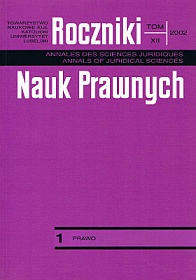Instruments of the State's Ecological Policy as Regards the Protection of the Air
Abstract
Ecological policy and its instruments essentially affect economy and other spheres of social. In practice, the management of environmental resources has two models of regulation. The latter makes it possible to reach the ends of ecological policy: the direct method based on administrative steps taken to define the levels of reducing pollution released to the environment; the indirect method means to create behaviours and preferences concerning thestate in which it is possible to reach a socially-acceptable level of production and consumption, thereby accomplishing a socially-acceptable level of pollution. (The paper discusses only part of the issues that establish the instruments of ecological policy of the state as regards the protection of the air. The problems of instruments called instruments of direct regulation will be published in the following „Annal of Natural Sciences”, fsc. 1).
Both methods use their respective instruments, by means of which the state monitors entrepreneurs and other organizational units in order to enforce them to take such actions that are desirable from the point of view of the policy to protect the environment.
Additionally, one can distinguish a group of instruments in the system of the instruments of direct regulation that I call instruments of the execution of law. Their specific character consists in their manner of influence on entrepreneurs, for their task is not so much to impose duties as regard protection of the environment, but to safeguard the performance of duties that have already been imposed by virtue of administrative decisions or common rules. These instruments play the role of supporting means to accomplish the ends of ecological policy. What I mean here is the following: fines for the encroachment on the demands of the protection of the environment, closing down the company or the exploitation of machines and devices that are hazardous for the environment.
References
Analiza skuteczności działania instrumentów ekonomicznych ochrony środowiskawPolsce, pod red.K.Górki,Kraków1999; http://www.mos.gov.pl/mos/publikac/Raporty_opracowania/instr_ekonom/index.html.
Brzeziński W.: Ochrona prawna naturalnego środowiska człowieka, Warszawa: PWN 1975.
Czachórski W.: Zobowiązania. Zarys wykładu, Warszawa Wyd. Naukowe PWN 1995.
Czaja S.: Instrumenty regulacji bezpośredniej i ekonomicznej w realizacji polityki ekologicznej w Polsce. Ocena efektywności ekonomicznej i skuteczności ekologicznej, [w:] Środowiskowe bariery rozwoju gospodarczego a przemiany strukturalne w Polsce (Materiały konferencyjne), (Biblioteka Ekonomia i Środowisko, nr 3), Warszawa 1993.
Dobrowolski G.: Ochrona powietrza. Zagadnienia administracyjnoprawne, Kraków: Wyd. Zakamycze 2000.
Domański G.: Sankcje majątkowe i opłaty za zanieczyszczenie środowiska w świetle nowej ustawy, „Palestra”, 1980, nr 6, s. 20-30.
Ekonomia środowiska i zasobów naturalnych, tł. I. Smolaga, pod red. H. Folmera, L. Gabela, H.Opschoora, Warszawa: Wyd. Krupski i S-ka 1996.
Fiedor B., Czaja S., Graczyk A., Jakubczyk Z.: Ocena efektywności działania handlu pozwoleniami na emisję na przykładzie emisji SO2 i propozycje wdrożenia rozwiązań do prawodawstwa polskiego w tym zakresie, Wrocław 2000 (materiał powielony).
Górka K., Poskrobko B., Radecki W.: Ochrona środowiska. Problemy społeczne, ekonomiczne i prawne, Warszawa: PWE 1995.
Jastrzębski L.: Prawo ochrony środowiska w Polsce, Warszawa: PWN 1990.
Kiss A., Shelton D.: Manual of European Environmental Law, Cambridge: Grotius Publications 1997.
Łętowski J.: Prawo administracyjne. Zagadnienia ogólne, Warszawa: PWN 1990.
Ministerstwo Środowiska. Projekt ustawy o ochronie środowiska, Warszawa, czerwiec 2000 r.
Radecki W.: Obowiązki podmiotów gospodarczych w dziedzinie ochrony środowiska, Zielona Góra: TNOiK 1991.
Redelbach A., Wronkowska S., Ziembiński Z.: Zarys teoriipaństwa i prawa, Warszawa: PWN 1994.
Skoczylas J. J.: Orzecznictwo Sądu Najwyższego z zakresu cywilnoprawnej ochrony środowiska za lata 1980-1990, (Rozprawy z zakresu prawa cywilnego iochrony środowiska, nr 1298), Katowice 1992.
Sommer J.: Prawne koncepcje ochrony czystości powietrza, „Ochrona Środowiska, Prawo i Polityka”, 1997, nr 1, s. 12-25.
Wrzosek S.: Zarządzanie środowiskiem przez administrację publiczną wPolsce, Białystok: Wyd. Politechniki Białostockiej 1999.
Copyright (c) 2002 Roczniki Nauk Prawnych

This work is licensed under a Creative Commons Attribution-NonCommercial-NoDerivatives 4.0 International License.


